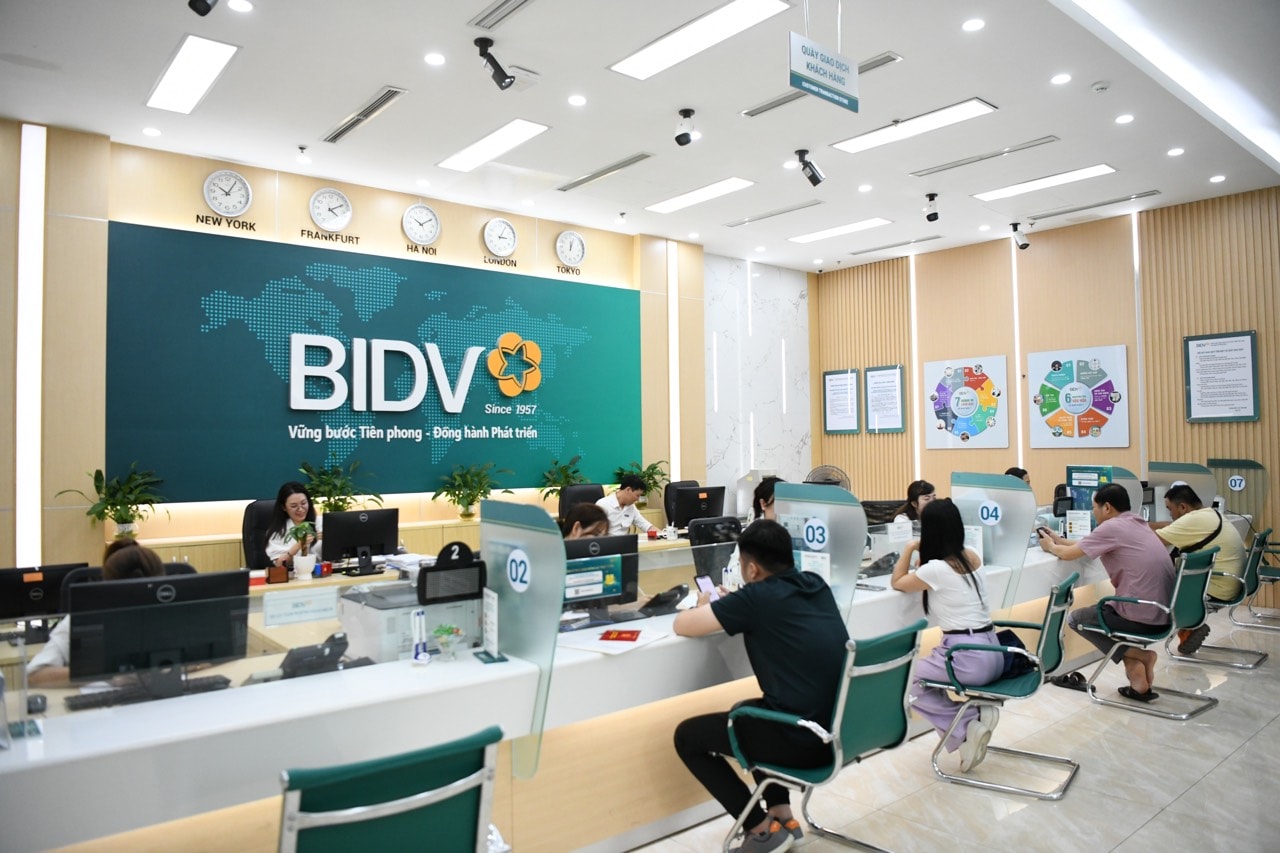Big 3 banking stocks before the capital increase race
Leading the market's capital-raising race are the Big 3 banks, led by Vietcombank (HoSE: VCB), which has received approval from the National Assembly to raise capital.

BID has announced that it is awaiting approval from the State Bank of Vietnam (SBV) to implement a private stock issuance equivalent to 2.9% of its charter capital in Q1/2025. Photo: BIDV
The race to raise year-end capital is being led by the Big 3 banks, which are listed on the public exchange and include VCB, BID, and CTG.
A capital increase of over VND 20.695 trillion, or 74.8% ownership rate from stock dividend payments, was approved by the National Assembly on November 30 by VCB. VCB intends to issue an extra VND 27.666 trillion using this strategy, increasing its charter capital to VND 83.557 trillion, the greatest amount of any credit institution in Vietnam. It is anticipated that VCB's 50% stock dividend distribution will increase the company's share price by at least 20% from where it is now, giving banking stocks the impetus to rise in the market.
According to financial statistics, VCB's consolidated pre-tax profit in the third quarter of 2024 was VND 10.699 trillion, the highest in the sector and an 18% year-over-year rise. Its pre-tax earnings for the nine months totaled VND 31.533 trillion, a 7% rise. By the end of September, VCB's total assets had grown by 5% from the beginning of the year to VND 1.93 quadrillion.
In the first nine months of 2024, VCB's loan growth was 10.2%. A partial rebound of the real estate market, improvements in the manufacturing sector, and greater system-wide credit disbursement towards year-end are expected to maintain the bank's 14% credit growth rate for the year.
KBSV predicts that growing input prices along with currency rate and liquidity risks would put pressure on VCB's net interest margin (NIM) in 2025. Low deposit growth and anticipated low lending rates meant to promote economic development create these difficulties. The SBV declared on October 17, 2024, that Construction Bank (CBBank) would have to be transferred to VCB. The financial statements of VCB will not include CBBank since it is still a separate legal organization. After fulfilling the required transfer plan, VCB will have the chance to grow its network, scale its operations, and maybe merge or divest CBBank.
BIDV is the second bank in the Big Three group. Rồng Việt Securities (VDSC) reports that BID is awaiting SBV approval to issue private shares in Q1/2025 that is equal to 2.9% of its charter capital. The market and finding investors will determine the remaining amount, or roughly 6.1% of charter capital.
The capital for the charter capital increase includes nearly VND 12 trillion in retained earnings from 2022 and over VND 1.6 trillion from additional stock issuance through private placements. BIDV stated that the private placement shares are targeted at professional securities investors, institutional investors both domestic and international, including some existing shareholders. The offering price will be determined based on market principles, and the shares will be subject to a three-year lock-up for strategic investors and a one-year lock-up for professional securities investors from the date of issuance.
In terms of credit growth, BID’s management announced plans to utilize its full SBV-approved credit growth quota of 14.04% for the year.
Vietnam Joint Stock Commercial Bank for Industry and Trade (VietinBank), the third bank in this battle for capital, is also getting ready to raise money. In order to raise charter capital, CTG's management proposed at the most recent shareholders' meeting to use all post-appropriation revenues from 2023—which come to more than VND 13.9 trillion—for dividend payments. The Ministry of Finance and SBV have given the bank permission to keep all of its 2022 earnings, or VND 11.678 trillion, in order to fund capital growth through stock dividend payments. Furthermore, CTG intends to use its 2021 retained profits and total retained earnings through the end of 2016 to increase charter capital by VND 12.33 trillion.

CTG is among banks with high-quality assets. Illustrative photo: CTG
CTG will have more than VND 91 trillion in charter capital if it is accepted and completely executed. In order to improve financial capacity and increase credit growth, CTG has also suggested to regulators that it keep all yearly profits from 2024 to 2028.
According to financial experts, CTG is an important state-owned bank that backs SBV and government programs. It is among the two banks in the sector with the lowest funding costs. Furthermore, CTG has maintained this finance edge thanks to advancements in ecosystem growth among its subsidiaries and CASA (current account savings account) rates.
With a non-performing loan coverage ratio above 100%, CTG is one of the best banks in terms of asset quality; yet, because of its greater risk appetite, its asset quality is marginally worse than that of other state-owned banks like BID and VCB.
Experts argue that capital increases are crucial for the Big 3 banks to strengthen financial capacity, expand operations, and improve governance. These efforts will enable the Big 3 to fulfill their roles as economic supporters and align with the strategy of having 2-3 Vietnamese banks ranked among the top 100 largest banks in Asia by total assets by the end of 2025.








